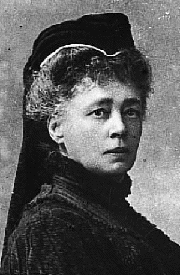June 9: Bertha von Suttner for Peace
Bertha von Suttner (1843)
It was on this date, June 9, 1843, that the first woman to receive the Nobel Peace Prize, Baroness Bertha von Suttner, was born Countess Kinsky in Prague, in what is now the Czech Republic. She was the posthumous daughter of Field Marshal Count Kinsky, yet despite the militaristic tradition in which she was reared, Bertha became a peace activist and an international figure in the movement to offer arbitration in place of warfare between nations.
She was born into a privileged household and took the opportunity to acquire an education in languages and music, as well as to travel and read. Her reading list included German philosophy and the works of Buckle and Haeckel. She worked, briefly, as Alfred Nobel's secretary, yet was his friend for life. Bertha married Baron Arthur Gundaccar von Suttner in 1876. The couple earned their living by writing, and during the next decade Baroness von Suttner produced an autobiography of her marriage, four novels and in 1880 a book called Inventarium einer Seele or Inventory of a Soul, in which she expressed her opinions on evolutionist authors such as Charles Darwin and Herbert Spencer, among other things. In Chapter 30 the Baroness explains her disbelief in Christianity and in a personal God.
In 1885 the couple moved to Austria where she continued to write and where she became involved in the work for which she is remembered today: the promotion of arbitration and peace in place of armed force in settling international disputes. She wrote several novels in favor of peace, including Maschinenzeitalter or The Machine Age, and Die Waffen Nieder or Lay Down Your Arms, both in 1889, and initiated the peace journal, also called Die Waffen Nieder, remaining its editor until the end of 1899. These were so persuasive she naturally became a peace movement leader, founding societies and raising money. She tried to popularize the idea of the Permanent Court of Arbitration. She was the only woman at the First Hague Convention of 1899.
Her husband died in 1902, but Von Suttner resolved to carry on. Perhaps anticipating the European Union, she repeated again and again that Europe is one and that uniting it was the only way to prevent the world catastrophe which seemed to be coming. Her former employer, Alfred Nobel, had established a peace prize to be awarded after his death, and in 1905 she won this much-deserved award — the first woman to be so honored. It is arguable that no such award would have existed had not Von Suttner and Alfred Nobel been so close.
Baroness von Suttner made no secret of her Rationalism, even if those she inspired thought otherwise of her. Her beliefs might best be described as Pantheism, seeing God only in nature, but her Rationalism was little more different from the Agnosticism espoused by Spencer. In her Memoirs, published in 1909, Von Suttner remarked that if she had been asked in her youth to describe her religion, she would have said, "None — I am too religious." She died on 21 June 1914, age 71, two months before the eruption of the world war she had warned and struggled against.
Originally published June 2003 by Ronald Bruce Meyer.


